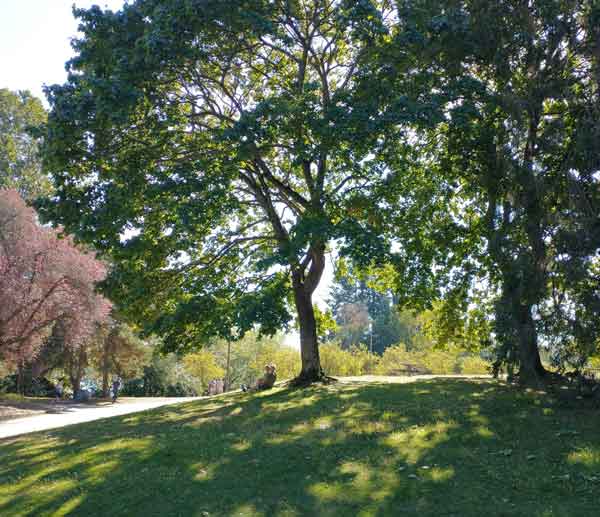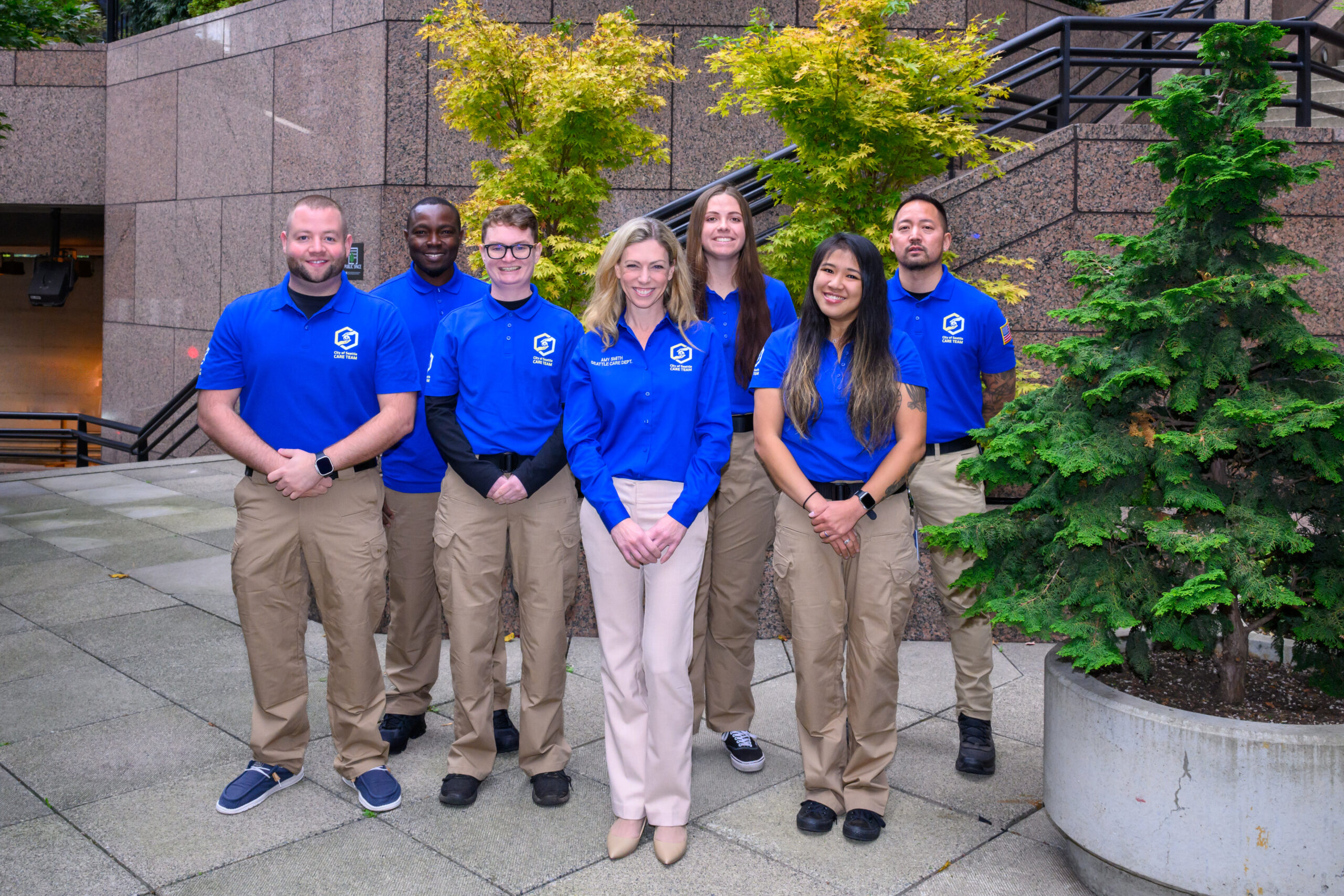Annual Reports
Councilmember Andrew Lewis' 2023 Annual Report
Toggle View
Councilmember Andrew Lewis' 2022 Annual Report
Toggle View
Councilmember Andrew Lewis' 2021 Annual Report
Toggle View
However, the acquisition and construction of PSH takes a significant amount of time. And while I sponsored and passed legislation to speed the process up, it will still take years and billions of dollars to sufficiently scale the housing we need. In the meantime, people need a place to stay with dignity and security. There are three broad choices of waiting room for PSH: enhanced shelter, jail, and tent encampments. Tiny houses are by far the most effective, affordable, and compassionate of those three choices.
Tiny house villages are an excellent enhanced shelter strategy to give people a place to stay that is not an encampment. They combine on-site services similar to PSH with a personal private living space and communal hygiene and dining facilities. In 2021, my office launched an initiative called “It Takes a Village” to build more tiny house villages with urgency, resulting in the new villages of Friendship Heights</a > and </a >Rosie’s Village, as well as doubling the size of Interbay’s Safe Harbor Village. The opening of these new units in November and December of 2021 allowed the City to offer shelter to people living in the encampments at Ballard Commons and Bitter Lake, restoring those spaces for recreational use.
The Council appropriated funding sufficient for three additional villages, or an equivalent form of enhanced shelter, to the King County Regional Homelessness Authority (KCRHA) which will hopefully lead to further expanded capacity in the first half of 2022. My office is also working on potential public-private partnerships to add additional villages with philanthropic support. The fastest and most proven way to give people a desirable alternative to living in encampments, and by extension restore parks to uses other than shelter, is to expand tiny houses.
The first priority of the government when tackling a public policy problem needs to be identifying how existing resources can be better deployed. This legislation guarantees no money is being left on the table in our effort to scale PSH.
At the beginning of 2021, Downtown and Pioneer Square were defined by large sprawling encampments posing a hazard to their occupants as well as neighboring businesses and residents. Removing these encampments proved to be futile, since residents merely moved down the street and set up in a new location. A new response was called for to combine outreach with supportive shelter placements and respond to the high needs of people living in encampments.
Given the scale of the crisis, it was clear City support would be necessary to achieve real results. In the spring of 2021, I introduced legislation to divert a portion of our federal relief funds to JustCARE to expand their area of coverage to Downtown and increase the program’s shelter capacity. This expanded partnership led to a series of significant improvements in the Downtown and Pioneer Square neighborhoods by conducting outreach at 3rd Avenue, the Pergola, 2nd</a ></a > Avenue Extension, City Hall Park, and many other locations. Without a doubt, these encampments would have continued to sit unaddressed but-for the innovative and active response of JustCARE.
As of this writing, JustCARE’s funding is scheduled to expire in June of 2022. We cannot let this happen. The coalition that has helped shape JustCARE includes service providers, business owners, and labor leaders. They have confronted challenges skeptics told them were insurmountable and confounded those expectations. Protecting and expanding JustCARE is a big priority for 2022. You can learn more about JustCARE in this evaluation from the University of Washington.
My office scoured the City budget for “underspend” - operating money that had been appropriated for other spending but went unspent because of various delays. We worked to redirect these savings in the mid-year supplemental budget so ?ál?al could finish on-time and at full strength. ?ál?al is now open and offering housing, case management, job training, and education in a culturally attuned way to the Native peoples most likely to be impacted by homelessness.
Neighbors living on and near North Queen Anne’s Florentia Street have been voicing strong concerns about unsafe traffic conditions for years. A large vibrant neighborhood has grown up around Florentia, making its designation as an arterial problematic. Large segments of the roughly half-mile arterial have incomplete or non-existent sidewalks, and traffic collisions are common as vehicles merge from the numerous neighborhood side-streets.
Changing an arterial designation is a long and cumbersome process, but in 2021 my office took it on. Arterials recognized as such in the Comprehensive Plan (Comp Plan) require a Comp Plan amendment, a process that takes many months. It starts in the spring when proposed changes are “docketed” for environmental review and departmental feedback. This feedback is then incorporated into a full package of Comp Plan changes sent for the Seattle Planning Commission’s final review. Finally, the Council votes to confirm the amendment.
In 2021, my office docketed the amendment and received support from executive departments for the change to go forward. Currently, Florentia’s official designation is expected to change in March of 2022. However, while the law will change, the design of Florentia will not change overnight. My office will fight in 2022 to bring improvements to Florentia, like speed humps, to make sure the new law and the street’s design are in alignment.
Engineering of public thoroughfares can be an expensive endeavor, and throughout COVID many important Vision Zero projects have been put on hold. By providing an annual on-going appropriation of $1.2 million, SDOT will have a reliable ongoing stream of funding to make progress on Vision Zero projects. Moreover, since the source is Commercial Parking Tax (CPT) SDOT has the flexibility to propose bonding the stream to build larger and more resource intensive projects.
We still have more to do to realize our Vision Zero goal. My hope is to build on this progress in the 2022 budget so all of our neighbors can safely walk and roll through their neighborhoods in safety.
Additionally, my office brought forward a successful amendment dedicating an ongoing additional appropriation of $1.2 million for infrastructure maintenance, including bridges. This flexible resource can be mixed and matched with other SDOT funds to make sure critical maintenance needs no longer go unaddressed.
With new federal resources on the way from the bipartisan infrastructure bill, and a possible transportation package in the next session of the legislature, we are poised to make significant progress in 2022 on necessary public infrastructure investments. This bonding package and new dedicated revenue stream are our first-step toward realizing those goals.
Over the summer and early fall I worked with Decriminalize Nature Seattle (now known as the Psychedelic Medicine Association of Washington) to follow in the footsteps of other cities and pass a resolution making enforcement of anti-entheogen laws the lowest enforcement priority of the Seattle Police Department. The resolution passed unanimously, making Seattle the first city in Washington to support an entheogens policy based in science and public health.
In 2022, my office will work to further codify these changes in an ordinance. It is also my hope the Washington State Legislature will take up this issue in the coming session.
Public assets cannot remain inactive while we wait for the Seattle process to determine their long-term use. My office will continue to work with community members to make sure public land is put to an interim public use for the benefit of the whole city.
While transportation-related emissions make up the largest single portion of Seattle’s carbon footprint, heating buildings is a significant source at approximately 23%. And about 74% of that is from the burning of natural gas. Reaching our climate goal requires taking action on all sources of CO2 emission, and in 2021 we made significant strides toward those goals with big changes to our energy code.
Together, these two bills from 2021 guarantee that the overwhelming majority of new buildings in Seattle will not be heated with fossil fuels. While we must continue to work to transition existing buildings away from fossil fuel heating, and strive to tackle other sources of CO2 related to buildings like materials and insulation, this is a big step forward to reach our climate goals.
Councilmember Andrew Lewis' 2020 Annual Report
At the beginning of the pandemic the only possible sanction for violating an emergency order was a criminal misdemeanor punishable by up to 180 days in jail and/or a $500 fine. There was no provision for assessing a civil infraction or a private right of action for a business owner to sue to a vendor for violating an order. An app-based delivery service continuing to charge pass through fees in excess of an emergency order cannot be jailed for failing to comply with the policy, nor is a $500 fine sufficient deterrence for a corporate actor to think twice about violating a City order. The Code had to be updated to be effective.
No issue looms larger in Seattle than the horribly inadequate supply of housing for our neighbors experiencing homeless. It is a disgraceful scar of shame that in one of the world’s wealthiest cities thousands of residents are forced to seek shelter in tents and RVs, doorways of businesses, and under bridges. It does not have to be that way. There is nothing inevitable about chronic homelessness and nothing inherently unsolvable about providing all our neighbors a place to live.
Throughout 2020 I worked closely with a coalition of small business owners and service providers called the Third Door Coalition to scale the best practice response to chronic homelessness, permanent supportive housing (PSH). PSH is the merging of housing units with onsite services, including treatment for substance addiction and mental health. 97% of residents placed in PSH maintain housing and do not return to a state of chronic homelessness. Scaling PSH is how Bergen County New Jersey, Salt Lake City Utah, and Helsinki Finland have significantly reduced chronic homelessness.
While PSH is one-third the cost of jail, and a whole year of PSH costs the same as three days in a hospital, it is still expensive. It costs $331,953 per-unit to build PSH, and while a lot of that cost is attributable to the materials and labor necessary for the build, a lot of it is due to regulations and red tape firmly within the City’s ability to waive. Homelessness is an emergency. We need to do everything in our power to expedite and expand PSH.
In December of 2020 I introduced CB 119975 to waive several significant cost drivers for PSH, including design review, unnecessary on-site bike storage, and broad administrative powers for the Seattle Department of Construction and Inspections (SDCI) to grant waivers and modifications, among other reforms. Together, Third Door Coalition estimates these changes could lower per-unit costs of PSH from $331,953 to $284,200, a savings of $47,753. Since PSH is almost entirely financed with taxpayer money this bill will allow us to stretch public resources to greater social benefit.
CB 119975 was heard in the Select Committee on Homelessness Strategies and Investments in December of 2020, and it is my hope the bill will reach final passage in the first quarter of 2021. I look forward to following-up on this critical legislation to significantly scale PSH throughout 2021 to meet the homelessness emergency.
November 2, 2020 marked five years since a state of emergency on homelessness was declared by then Mayor Ed Murray. While only housing, transitional shelter, and services can truly provide people a safe place to stay and end homelessness, outreach is the first critical step. For the last several years that outreach came from the controversial Navigation Team, an integrated unit of outreach workers and police officers housed within the Human Services Department (HSD). In 2020 the City Council and the Mayor collaboratively created a successor entity called the Homelessness Outreach and Provider Ecosystem, or the HOPE Team.
The Navigation Team was not a law enforcement unit. Their mission was to provide outreach to unsanctioned encampments and conduct removals of encampments under certain circumstances. Given their outreach role the presence of police in the unit was controversial from the beginning. A 2017 report from the Seattle City Auditor cited studies indicating high prevalence of distrust between homeless individuals and outreach workers in jurisdictions using officers for outreach, and local outreach providers frequently criticized the practice as hampering their efforts.
To incorporate recommendations from outreach providers and the Auditor, the Council and Mayor agreed to consolidate non-profit provider outreach and City resources in one combined team. Under this arrangement, City employees themselves would no longer conduct outreach. Rather, contracted outreach providers, already the majority of all outreach, will be the primary on-the-ground point of contact, while City employees in HSD will coordinate the delivery of essential City services, like garbage pickup, mental health and addiction treatment, and access to shelter.
Originally called the Unsheltered Outreach and Response Team, this new approach to outreach was created by my bill CB 119942 which passed with only Councilmember Kshama Sawant dissenting. Several weeks later this team was renewed for 2021 with additional resources and renamed the HOPE Team in budget legislation put forward by my colleague Councilmember Morales. The HOPE Team will lead with engagement and sync together the expertise of outreach workers and City resources. This new outreach strategy will be critical as we go into another challenging year to grapple with the state of emergency on homelessness.
The very first piece of legislation I prime sponsored, Resolution 31941, created the Committee on Performance Auditing to provide a set of recommendations to beef up our performance auditing practices. The Working Group is composed of former auditors, academics, and community leaders with a deadline to submit recommendations in time for the Council’s 2021 budget deliberations. You can learn more about the committee here.
Legislating is not just about creating important new policies and programs. It also entails follow-up and oversight to make sure relief gets to the people who need it on time and on budget. My hope is that in next year’s annual report we will be able to report the creation of a municipal auditing system that is second to none.
From the Crocodile to the Showbox District 7 has some of Seattle’s most iconic nightlife venues. A city does not become a music capital overnight, but that status can ebb away if live performance venues and nightlife businesses are not supported. In 2012, Amsterdam created a city official colloquially referred to as the nachtburgemeester, Dutch for “night mayor,” to serve as a resource and point-of-contact for nightlife businesses. In 2015 Seattle followed Amsterdam’s lead, creating our own night mayor, the “nightlife business advocate.”
The nightlife business advocate, commonly referred to as the night mayor, helps Seattle’s nightlife institutions comply with municipal codes, secure permits, and troubleshoot with state regulators to maintain compliance. The position was cut in the initial budget putting the recovery of an industry that was the first to close, and will be the last to reopen, at risk.
The Seattle Fire Department (SFD) responded to 91,716 calls for service in 2019, 62% for basic life support. SFD medic units respond to an average of 7.4 aid calls a day, sometimes for very minor injuries or complaints not requiring an emergency response. When 911 is called the brave firefighters of SFD have to respond and render aid. For efficient deployment of resources, and firefighter wellness, we owe our firefighters the commitment to not dispatch them unless absolutely necessary.
During my mom’s career as a nurse she served for a time as a telephonic consulting nurse, allowing patients to call in with complaints for over the phone diagnosis and care recommendations. This critical service can help resolve calls for assistance without the dispatch of firefighters to the scene.











